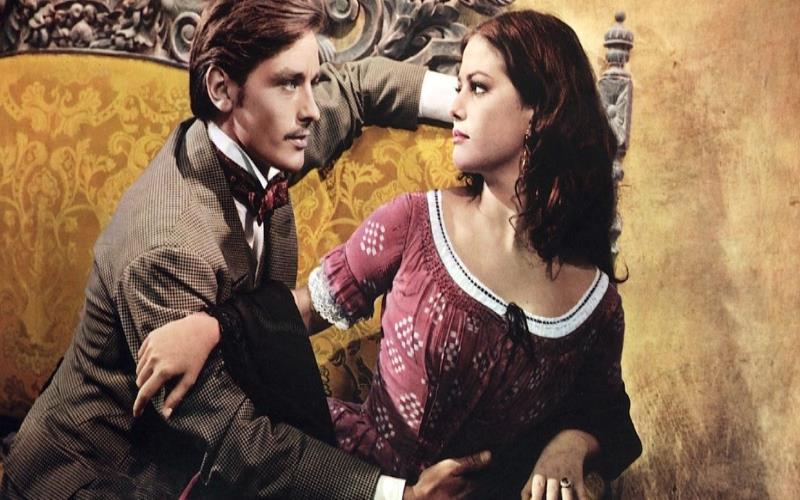
Caligula, a 1979 film directed by Tinto Brass and produced by Bob Guccione, is notorious for its explicit content and shocking portrayal of the life of the Roman Emperor Caligula. While there may be other films that touch upon similar themes of political intrigue, decadence, and the brutalities of ancient regimes, few approach the level of intensity and explicitness found in Caligula. Nevertheless, the following list explores 9 similar movies like Caligula, providing a glimpse into the darker aspects of history and human nature.
“Satyricon” (1969)
Directed by Federico Fellini, “Satyricon” is a surreal adaptation of the ancient Roman novel by Petronius. The film follows the adventures of Encolpius and Ascyltus as they navigate a world filled with hedonism and decadence. Much like “Caligula,” “Satyricon” paints a vivid picture of the excesses of Roman society, including scenes of orgiastic revelry and debauchery. The film’s dreamlike and often grotesque visual style captures the chaotic and unpredictable nature of the ancient world.
“The Last Emperor” (1987)
“The Last Emperor” tells the story of Puyi, the last emperor of China, from his early years on the throne to his downfall and eventual imprisonment. Directed by Bernardo Bertolucci, the film explores themes of power, identity, and the loss of tradition. Although not as explicit as “Caligula,” the film shares a similar interest in exploring the complexities of absolute power and its impact on individuals and societies.
“Spartacus” (1960)
Directed by Stanley Kubrick, “Spartacus” tells the story of a gladiator who leads a slave revolt against the Roman Empire. While it is a more mainstream film than “Caligula,” “Spartacus” touches on similar themes of political intrigue, power struggles, and the brutalities of the ancient world. The film’s epic scale and intense battle scenes offer a different perspective on the might and cruelty of the Roman Empire.
“Gladiator” (2000)
Ridley Scott’s “Gladiator” follows the story of Maximus, a Roman general who seeks revenge against the corrupt Emperor Commodus. The film explores themes of betrayal, revenge, and the quest for justice in a world rife with political machinations. Like “Caligula,” “Gladiator” delves into the darker aspects of the Roman Empire, highlighting the brutality of the arena and the struggle for power.
“Quo Vadis” (1951)
“Quo Vadis” is a classic Hollywood epic set during the reign of the tyrannical Emperor Nero. The film follows the love story between a Roman officer and a Christian woman as they navigate the dangerous political landscape of ancient Rome. Like “Caligula,” “Quo Vadis” explores the theme of absolute power and its corrupting influence, as well as the tension between pagan and Christian beliefs.
“300” (2006)
Based on Frank Miller’s graphic novel, “300” tells the story of the Battle of Thermopylae, where a small group of Spartans led by King Leonidas faces off against the massive Persian army. While the film focuses on the Spartans rather than the Romans, it shares similar themes of heroism, brutality, and the quest for glory. “300” offers a stylized and visually striking portrayal of ancient warfare and the lengths people will go to defend their ideals.
“Nero” (2004)
“Nero” is a German-Italian television miniseries that explores the life and reign of the infamous Roman Emperor Nero. Like “Caligula,” the series delves into the decadence, cruelty, and political intrigue that defined Nero’s rule. The series provides a detailed look at the complexities of Nero’s character and the challenges he faced as he grappled with power and ambition.
“Pompeii” (2014)
“Pompeii” is a historical disaster film set in the ancient city of Pompeii during the eruption of Mount Vesuvius. While the film’s primary focus is on the love story between a gladiator and a merchant’s daughter, it also explores the societal decadence and corruption that characterized the era. Like “Caligula,” “Pompeii” highlights the opulence and hedonism of the time, juxtaposed with the looming threat of destruction.
“I, Claudius” (1976)
Based on the novel by Robert Graves, “I, Claudius” is a British television series that chronicles the history of the Roman Empire through the eyes of Emperor Claudius. The series delves into the power struggles, conspiracies, and scandals that defined Claudius’s reign, providing a detailed and nuanced portrayal of ancient Roman politics. While less explicit than “Caligula,” “I, Claudius” shares a similar interest in exploring the darker aspects of history and the complexities of power.
These films and series provide a range of perspectives on the themes explored in “Caligula,” offering viewers a chance to immerse themselves in the complex and often brutal world of ancient empires. Whether through epic battles, political intrigue, or personal stories of love and loss, these works capture the essence of a tumultuous and transformative period in history. If you are a fan of sci-fi and space movies, follow us to discover more excellent movies like The Martian.
